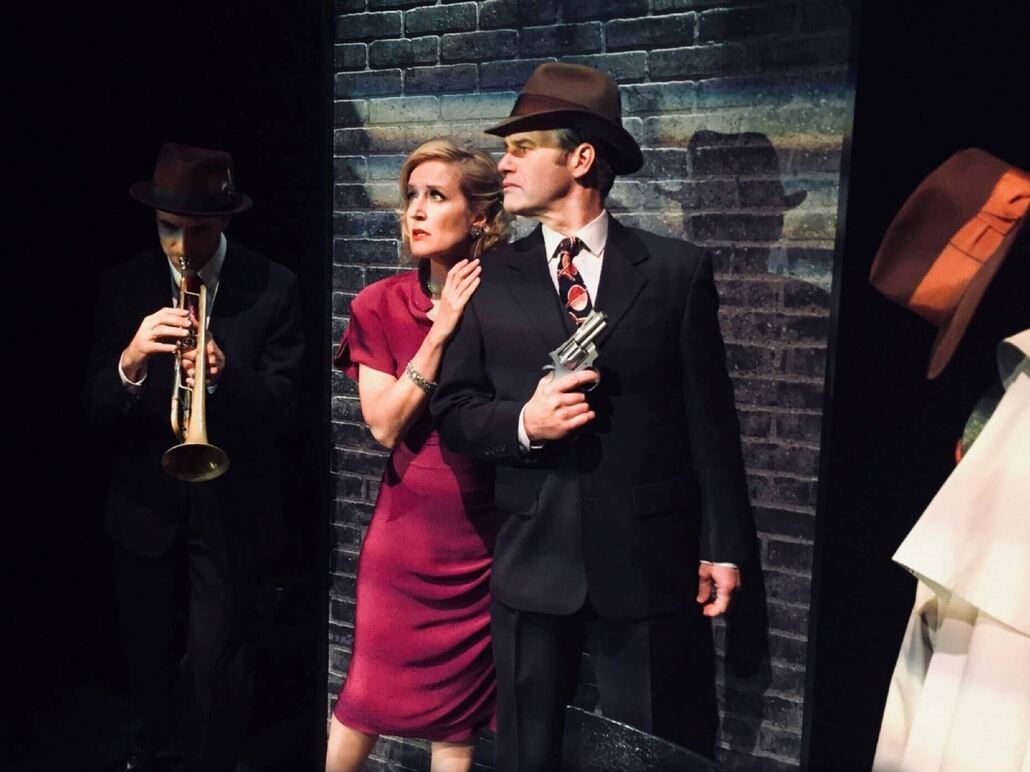Theater mixes improv and Shakespeare
Impro Theatre impresses audiences by putting on full plays that are improvised.
Impro Theatre impresses audiences by putting on full plays that are improvised.

Many hear “improv” and think of quick, snappy short-form comedy. Others might go for “crowd participation” or “thinking on one’s feet.” However, at Los Angeles’s Impro Theatre, they think of renowned writers Tennessee Williams and William Shakespeare. Despite starting as a traditional improv troupe, Impro Theatre now denominates itself as an “improvisational theatre company,” paying homage to the great playwrights and fictions of history by coming up with a full play in the style of a famous writer — completely on the spot.
Impro Theatre focuses on “narrative improv,” founder Dan O’Connor said. The group saw an opportunity to perform a style of improv that could become dramatic or scary just as much as it could elicit laughter from the audience.
“We wanted to do theater of the moment,” O’Connor said. “We wanted to create a play in real time in front of the audience that was just as good as scripted stuff.”
A whole generation of actors influenced by the ideas of Keith Johnstone, a pioneer in improvisation, came together to spearhead Impro, O’Connor said. Johnstone’s ideas were varied, including short-form games and “theatresports,” a style of short-form improv in a competition format. His school of thought gradually moved from the United Kingdom across Canada and eventually to California, inspiring a group of trained actors in Los Angeles with the desire to explore both improv and traditional drama.
“All of us went to acting school, all of us are professional actors,” O’Connor said. “We should also be thinking about other ways we can do unscripted theater.”
While Impro’s narrative improv emulates the style of plays from the past, it is a completely unique experience for both the viewer and the performer.
“If you’re in the audience and you give the suggestion … at the top of the show and we use it, you are part of the show … and the rest of the audience is also a part of the show because they’re watching that play being written in real time for them,” O’Connor said.
There was a time when improv was seen as less- than in the world of theater, but this may be changing. When he started practicing improv, O’Connor noticed the discipline was not held in high regard.
“Improv was kind of a dirty word because theater people didn’t think improv was theater, “ O’Connor said.

Nick Massouh, an adjunct lecturer of dramatic arts, USC alum and longtime Impro member, sees the tides changing on this issue. Most commercial casting calls, he said, require some improv experience.
“If you don’t have some improv on your resume, you’re probably not going to get a commercial agent,” Massouh said.
Massouh first became intrigued by improv during his time as an undergraduate student at USC, setting the stage for a decades-long career in the field. However, he didn’t get into a troupe the first time around.
“I had no experience, I just showed up to the audition … I didn’t make it in that first year, but they were like, ‘You’ve got to come back and audition again next year,’ so I did,” Massouh said. “We had a really great group … we were performing every Friday, we had such a cool chemistry that we were able to increase the size of the audience.”
Even after succeeding with improv on campus, Massouh realized there was a lot more to learn in improvisational performance. Not only was he a perfectionist, he saw that there was an immense potential in improv and what could be done through its lens.
“At the end of it, I still don’t think I really knew how to do improv,” Massouh said. “I think there was still a lot left to learn.”
He added that this was around the time he reached out to O’Connor and perfected his trade at Impro.
Today, Impro is as much a theater company as it is a theater school, but always with an improvisational base. Founding member Jo McGinley has been teaching at Impro since its inception, and spoke on her role as both a company member and as one of its most influential instructors.
“I started a long-form [improv] lab, which meant … everyone knew how to improvise now,” McGinley said. “They were coming to this class to learn genre … I had students who were with me every Thursday night for five or six years.”
McGinley first saw the challenges in this form of performance when asked to adapt sci-fi to the narrative improv stage.
“The only sci-fi that I had any connection to personally was the Twilight Zone,” McGinley said. “That became the very beginning of learning how to put that very difficult genre on the stage — it ended up being one of my favorites, but it was really nice to just have this environment of, ‘What’s next?’ ‘What can we do now?’”
Now, Impro continues to grow, adding new company members that McGinley foresees could change the game as much as the generation of improvisers who taught them. Beyond simply performers and actors, McGinley believes there is much to be learned from improv that is applicable in many professional and even social environments.
“We improvise every single day of our lives, but we’re not given this official improv training,” McGinley said. “Improv just as a life lesson should be taught to every human being.”
We are the only independent newspaper here at USC, run at every level by students. That means we aren’t tied down by any other interests but those of readers like you: the students, faculty, staff and South Central residents that together make up the USC community.
Independence is a double-edged sword: We have a unique lens into the University’s actions and policies, and can hold powerful figures accountable when others cannot. But that also means our budget is severely limited. We’re already spread thin as we compensate the writers, photographers, artists, designers and editors whose incredible work you see in our daily paper; as we work to revamp and expand our digital presence, we now have additional staff making podcasts, videos, webpages, our first ever magazine and social media content, who are at risk of being unable to receive the compensation they deserve.
We are therefore indebted to readers like you, who, by supporting us, help keep our paper daily (we are the only remaining college paper on the West Coast that prints every single weekday), independent, free and widely accessible.
Please consider supporting us. Even $1 goes a long way in supporting our work; if you are able, you can also support us with monthly, or even annual, donations. Thank you.
This site uses cookies. By continuing to browse the site, you are agreeing to our use of cookies.
Accept settingsDo Not AcceptWe may request cookies to be set on your device. We use cookies to let us know when you visit our websites, how you interact with us, to enrich your user experience, and to customize your relationship with our website.
Click on the different category headings to find out more. You can also change some of your preferences. Note that blocking some types of cookies may impact your experience on our websites and the services we are able to offer.
These cookies are strictly necessary to provide you with services available through our website and to use some of its features.
Because these cookies are strictly necessary to deliver the website, refusing them will have impact how our site functions. You always can block or delete cookies by changing your browser settings and force blocking all cookies on this website. But this will always prompt you to accept/refuse cookies when revisiting our site.
We fully respect if you want to refuse cookies but to avoid asking you again and again kindly allow us to store a cookie for that. You are free to opt out any time or opt in for other cookies to get a better experience. If you refuse cookies we will remove all set cookies in our domain.
We provide you with a list of stored cookies on your computer in our domain so you can check what we stored. Due to security reasons we are not able to show or modify cookies from other domains. You can check these in your browser security settings.
These cookies collect information that is used either in aggregate form to help us understand how our website is being used or how effective our marketing campaigns are, or to help us customize our website and application for you in order to enhance your experience.
If you do not want that we track your visit to our site you can disable tracking in your browser here:
We also use different external services like Google Webfonts, Google Maps, and external Video providers. Since these providers may collect personal data like your IP address we allow you to block them here. Please be aware that this might heavily reduce the functionality and appearance of our site. Changes will take effect once you reload the page.
Google Webfont Settings:
Google Map Settings:
Google reCaptcha Settings:
Vimeo and Youtube video embeds:
The following cookies are also needed - You can choose if you want to allow them:
